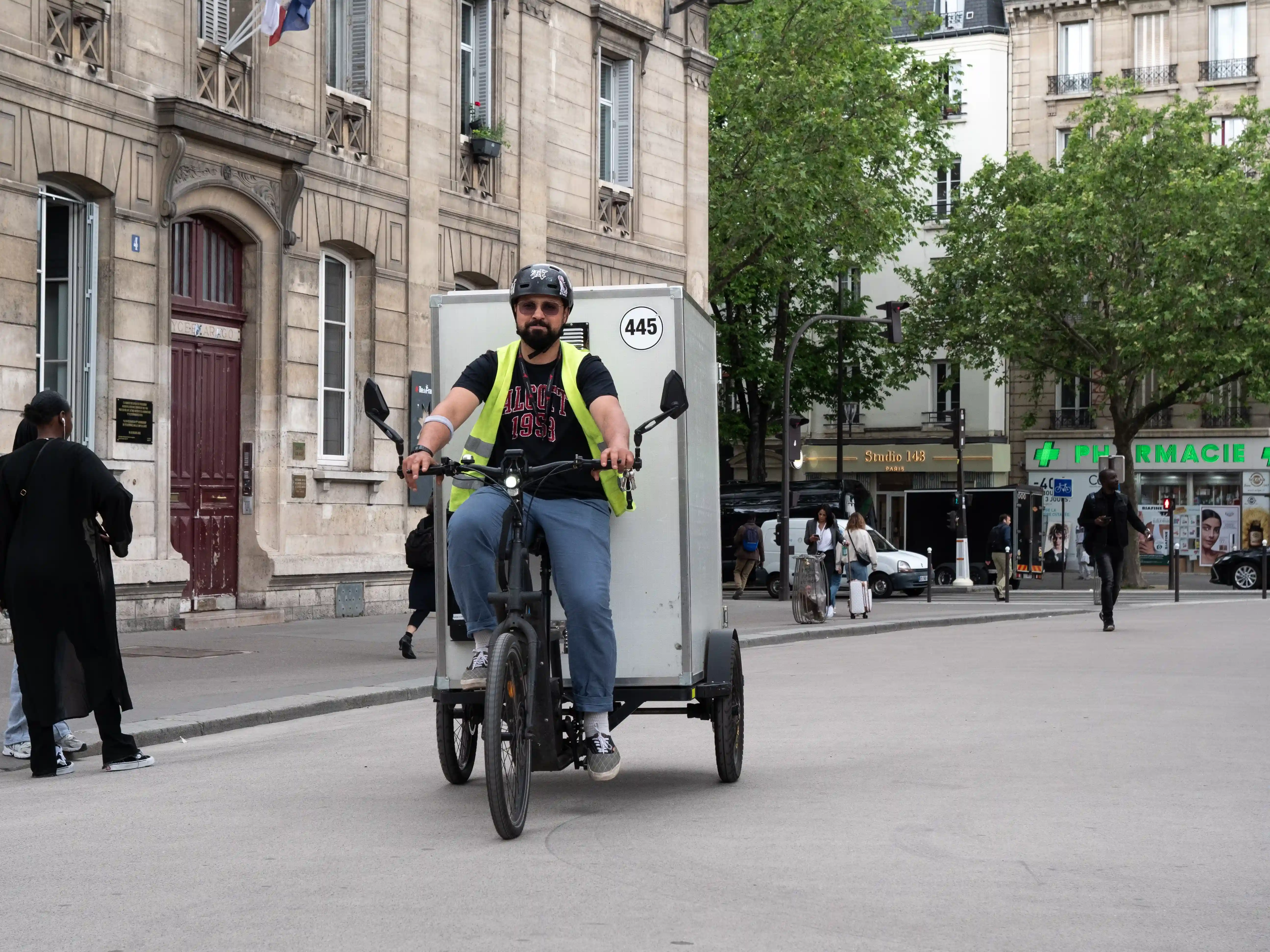
Professional cargo bike: choosing the right cargo bike
In a world where urban mobility is becoming a central issue for businesses, professional cargo bikes and triporters are presenting themselves as innovative and effective solutions. These modes of transport, adapted to urban logistics, offer a concrete response to the challenges posed by traffic jams, access restrictions in city centers and the reduction of the carbon footprint.
Electric cargo bike, electric bikes, tricycle... what are the differences?
The terms “cargo bike”, “electric bike” and “scooter” are often used interchangeably, but each refers to specific characteristics that can meet different needs and applications. Let's clarify these concepts to help guide your choice better.
Cargo bike:
A cargo bike refers to a bike designed specifically to transport heavy or bulky loads: here we are mainly talking about freight transport (used on the professional side) or the transport of people, including the transport of children (use on the private side).
The cargo bike is generally equipped with a reinforced structure, a larger loading area and storage solutions (baskets, boxes, etc.). These bikes can be equipped with two or three wheels, depending on the model and manufacturer.
Electric bike :
An electric bike is equipped with an electric motor that assists pedaling. There are two types of electric bikes:
- VAE : electric bike: This type of bike has a motor power of up to 250 watts maximum, i.e. a speed of 25 km/h. Thus, VAE are considered to be “classic” bikes and can use bike lanes and the driver is not required to wear a helmet or have insurance.
- Electric bike : From a regulatory point of view, electric bikes are considered to be mopeds. Two consequences to this: they cannot use bike lanes and the driver must have insurance, wear a helmet, gloves and have a license plate. Learn more here
Note: some e-bikes can go beyond 25km/h, so they are subject to moped regulations.
Tricycle:
The tricycle is a specific shape of the cargo bike.
Equipped with 3 wheels, the tricycle ensures increased stability and is ideal for transporting very heavy or bulky loads. In particular, the scooter is used in contexts where maneuverability and safety are essential, such as dense urban environments or for applications such as last-mile delivery, the waste management Or the material transport.
These vehicles are designed to offer alternatives efficient and ecological to motorized vehicles, especially in urban areas.
The distinction between these types of bikes is not just a matter of terminology, but also of functionality & use.
Indeed, choosing the right model requires an understanding of your specific needs in terms of load, distance, terrain, frequency of use and other business criteria.
Cargo bikes & tricycle bikes can be equipped in different ways to adapt to various sectors of activity, offering a customization that can be crucial for the operational efficiency of each company.
Why choose a cargo bike for your professional activity?
Adopting a cargo bike or tricycle for a professional activity offers many advantages compared to more traditional means of transport.
These advantages are evident both in terms of: economic, ecological what practice, making these vehicles particularly suited to urban challenges.

Reduced operational costs
Cargo bikes significantly reduce operational costs for several reasons.
First of all, they do not require fuel & maintenance costs are lower than a conventional commercial vehicle. Finally, bikes are exempt from various taxes and parking fees.
In the long term, this represents significant savings, especially in cities where parking costs and fines can quickly add up.

Increased efficiency in last-mile delivery:
Last-mile delivery is often the most complex and expensive in the supply chain.
Cargo bikes & tricycle bikes reduce the time needed to make deliveries, in particular thanks to their agility and ability to navigate easily through urban traffic. This flexibility of movement makes it possible to achieve more deliveries in less time.

Favorable ecological impact:
In a context where environmental concerns are increasingly important, opting for a cargo bike contributes positively to the eco-responsible image of your company. Indeed, these vehicles do not emit CO2 and contribute to the reduction of noise and air pollution.
For companies committed to social responsibility initiatives, the use of cargo bikes is a tangible approach to support their environmental values.

Adaptability and personalization
Cargo bikes and tricycle bikes are extremely flexible. They can be customized to meet the specific needs of each activity, whether it is transporting goods, tools or even setting up mobile stations for technical interventions or commercial promotions. This flexibility allows businesses to design a work tool that perfectly matches their daily operations.
Compared to motorized commercial vehicles, cargo bikes and tricycle bikes offer an alternative that combines efficiency, respect for the environment and economy. For businesses operating in urban areas, they represent not only an intelligent logistics solution but also a commitment to a more sustainable future.
What are the selection criteria for your cargo bike?

Load capacity & transport volume:
The first criterion to consider is the load capacity of the cargo bike.
For professional use, it is essential that the bike can carry large volumes and weights. Cargo bikes are generally designed to carry between 100 and 250 kg.
Check the maximum load specifications and make sure they match your daily needs in terms of weight and volume of the goods to be transported. A scooter with a good load capacity will reduce the number of trips required, optimizing time and efficiency.

Motorization & autonomy:
For professionals operating in urban areas or on routes with differences in altitude, choose a cargo bike with a electrical assistance is indispensable.
This makes it easier to get around without exhausting the driver, especially when the bike is loaded. So check the type of motor, its power and the electrical assistance it offers.
Autonomy is also important, especially if the daily routes are long. So check the battery capacity and estimate the actual battery life based on your use.
Note: the actual autonomy depends on a lot of factors (level of electrical assistance selected, wind resistance, altitude difference in delivery...)

Maneuverability & dimensions:
The bike should be easy to maneuver, especially in congested urban environments.
The dimensions of the bike must allow it to circulate easily on bike paths and to pass through areas with traffic restrictions. It is also important that the bike can be easily parked without requiring too much space.

Durability & robustness:
A professional cargo bike should be built to withstand intensive daily use. Opt for models made with high quality materials that guarantee longevity and resistance to various weather conditions.
Maintenance should be simple and parts easily replaceable to minimize service interruptions.
Today, certifications exist to ensure the robustness of cargo bikes. At VUF Bikes, all our cargo bikes are certified DIN 79010.

Modularity:
Choosing a cargo bike that offers customization options can be a major asset in adapting specifically to your business. Indeed, there may be specific needs related to the various professions.
Whether it is for the type of housing, additional modules for the secure transport of certain types of goods or special configurations for tools or equipment, the ability to customize your bike according to your specific needs is an important criterion.

Certification & standards:
When selecting a cargo bike for professional use, it is essential to consider certifications and compliance with safety and environmental standards.
Bikes that meet strict standards, such as the ATP certification for refrigerated transport or the PIEK standard for silent deliveries at night, ensure that the vehicle is suitable for specialized transport.

Comfort and ergonomics:
Driver comfort is crucial, especially during prolonged and daily use. It is therefore important to check the quality of the seat, the driving position, and whether the handlebars and the seat are adjustable. A well-designed bike reduces fatigue and wear
The aim is to be in a position to select who not only meets your professional requirements but also ensures efficient and safe operation.
Additional technical considerations

Materials used:
The materials selected for the manufacture of cargo bikes have a significant impact on their weights, their resistor And their sustainably.
Aluminum frames are popular for their lightness and corrosion resistance, ideal for frequent outdoor use. Steel is also used for its simpler shaping and increased strength, which is essential for transporting heavy loads.

Braking system:
Given the extra weight cargo bikes regularly carry, an effective braking system is crucial.
Disc brakes are often preferred for their ability to provide consistent and powerful braking force. Hydraulic brakes offer better modulation and require less manual force, which is beneficial during long delivery days.

Wheel quality:
The wheels on a cargo bike must be both sturdy and able to handle the weight of the loads carried without fail.
The rims should be reinforced and the tires selected should offer good grip and puncture resistance to minimize untimely stops due to punctures.
Cargo bikes for professionals | VUF Bikes
At VUF Bikes, we understand that each professional has unique needs, which is why we offer a range of 100% modular scooters adapted to various professional uses: delivery, industry, crafts...
VUF XXL MAX

The VUF XXL MAX tricycle is ideal for transporting heavy loads And of bulky equipment. With a width of 110cm, the bike remains within the standard width of cycle paths. 100% modular, the VUF XXL MAX is adapted to numerous sectors of activities : delivery, passenger transport, food & pharmaceutical products transport, waste collection...
VUF XXL FIT

The VUF XXL FIT is a tricycle nimble and facile unto To pilot. It can support up to 150Kg of payload or 1.7m3. With a width of 100cm, the VUF XXL FIT is perfectly suited to last-mile delivery.
VUF M

Our VUF M model is a lightweight, easy to ride and versatile cargo bike. It is a bike perfectly suited for local deliveries and for a mixed use of parcel & mail delivery.
.svg)

.svg)
.svg)


